#Bruce Peninsula camping
Explore tagged Tumblr posts
Text

Cottage/cabins rental Sauble Beach
Which is the best thing to do in canada ? Is it Sauble beach camping or rent a cottage in Bruce Peninsula or Bruce Peninsula camping or a memorable visit to Owen Sound Falls or camping at Owen Sound Beach or step out for Owen Sound hiking trails or end up at kilsyth country camping (KCC) Owen Sound to make it the most lovely and memorable day of your life . You will get here everything you have imagined, be it camping or fishing or biking or any other exiting to do activities.
0 notes
Text

"Scenes as Residents of St. Vincent and Sydenham Leave New Tank Range," Owen Sound Sun-Times. October 1, 1942. Page 6. --- The northern tips of St. Vincent and Syndenham Townships are today a new Canadian Army tank range. Rolling farm-lands which for years have been devoted to feeding Canadians are now serving another purpose, being used to train men to guard Canadians against the loss of those things they prize more than life itself. All residents of the area have now departed for their new homes. Here are scenes as the evacuation was in full swing. Upper left, Carol Jane McKee, aged 7, and Yvonne McKee, aged 9, 4 sit the steps of the Balaclava school, their books in their arms, as they any well to this school house. They are the daughters of Mr. and Mrs. Russell McKee and will reside near Allenford. Top centre is a view of a Sydenham group, helping Mrs. Margaret Eagles pack her belongings into a truck for removal to her new home at Owen Sound. From left to right are Jimmie Lemon, Carewood White, Miss Katherine Lemon, M. Donald Lemon, Mrs. Margaret Eagles and Clifford King. Upper right is scene familiar in the district in the past few weeks, a truck-load of hay. Standing on the hood of the truck is Rae Bumstead, while at the left is the owner of the hay, John Cathrae, who is moving to a farm in Keppel Township. Lower left is sbown one of the warning signs erected along the boundaries of the area. The man on the right Josh Gammon of Hawkestone, Ont., who was directing William Briggs and Geedon Hedekinson of Meaford in the work of erecting barriers across the roadway. Lower right is a picture of S.S. No. 12, St. Vincent, closed because it stands four rods inside the tank area, although eleven of the school's fourteen pupils reside outside the area and will now have to go as far as five miles to St. John's school. Standing is the school door in the picture is George Moire, a member of the school board of S.S. No. 12 - Sun-Tunes Staff Photo
#meaford#meaford military camp#camp meaford#tank range#canadian army#armored warfare#tank regiment#military training#moved by the state#forced migration#farming in canada#toronto#rural canada#bruce peninsula#canada during world war 2#land expropriation#world war ii
3 notes
·
View notes
Text
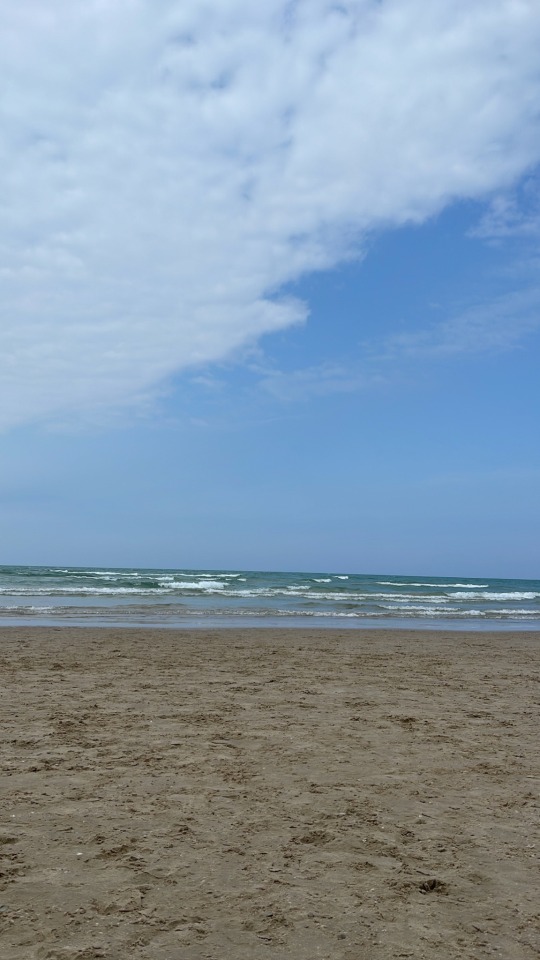


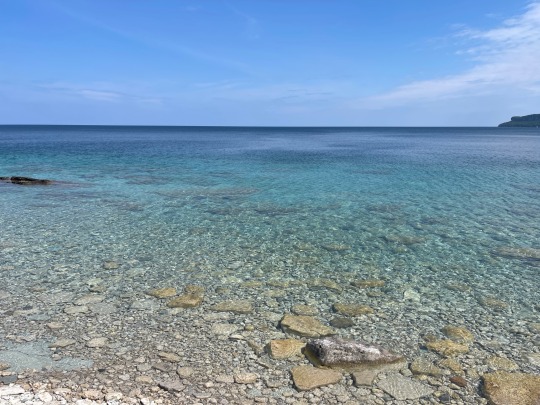
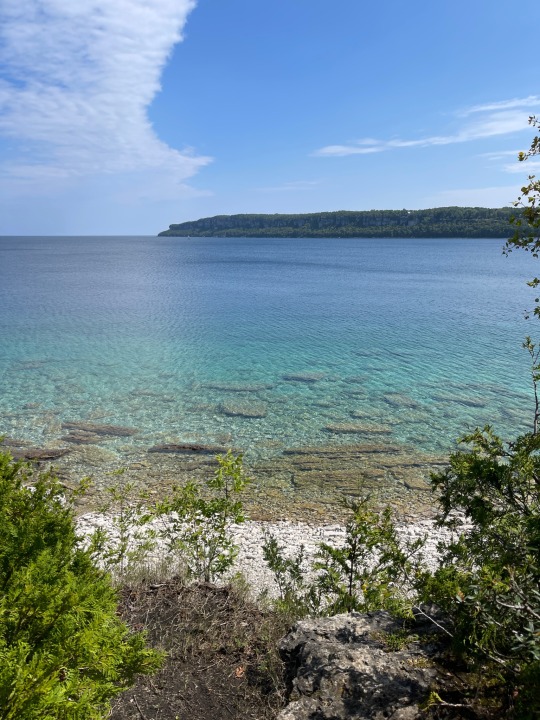
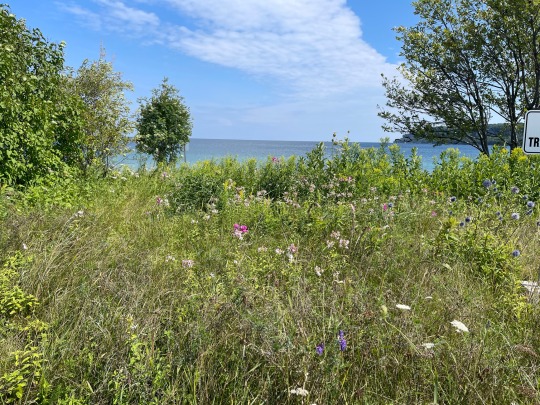
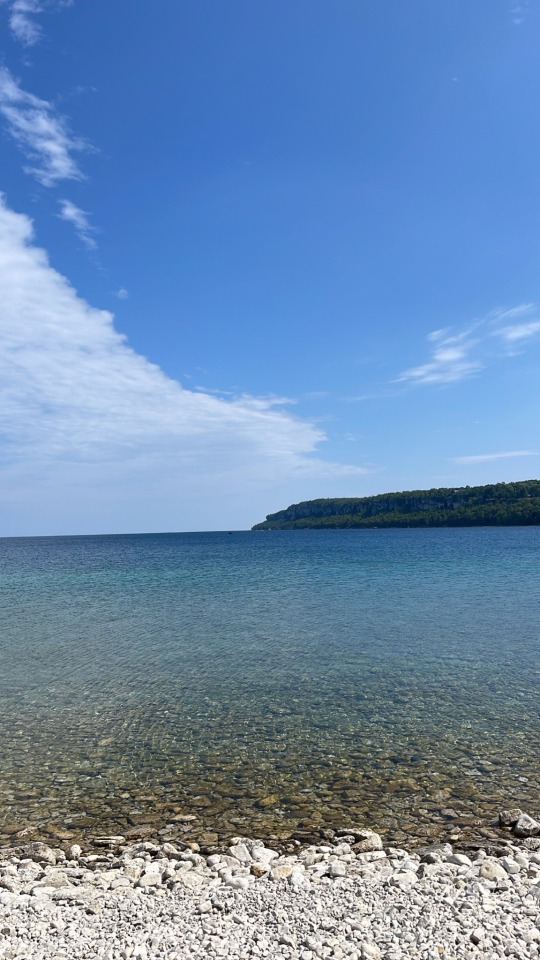
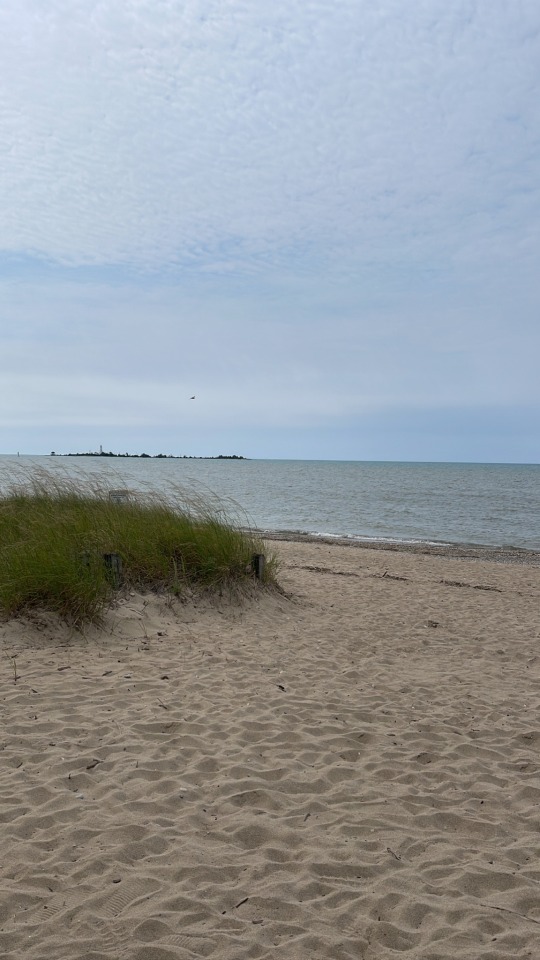
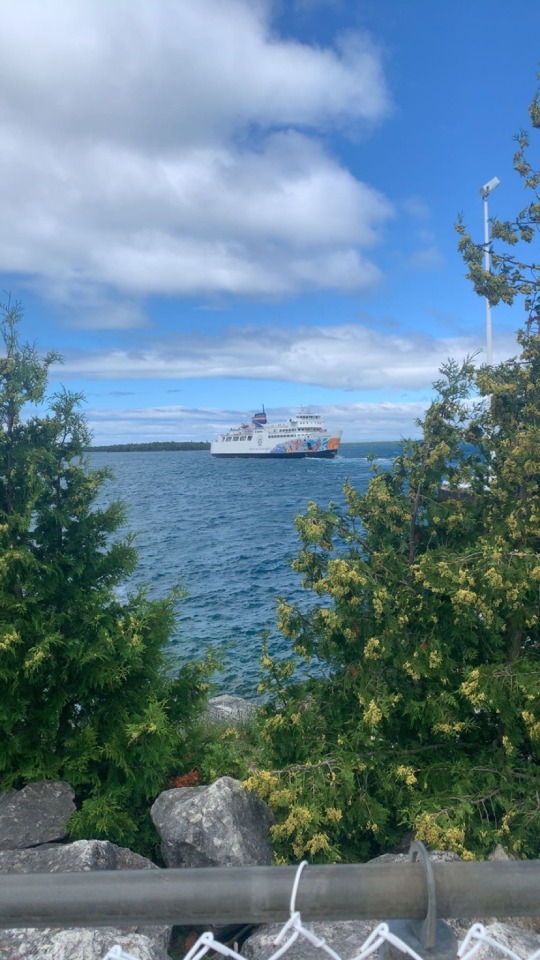

True Blue 🌊💙
#the great lakes#summer#beachgirl#summer girl#summer break#camping#nature#wilderness#hikes#canoeing and kayaking#georgian bay#lake huron#bruce peninsula#cold summer
4 notes
·
View notes
Text
Blog 5: Free Write - Camping & Nature
As there was no prompt for this week's blog, I decided to look back on my life experiences and talk about one tradition my family does every summer that has brought us all closer to nature, and that's our annual camping trip. Every year my family and some of my extended family take a trip down to the Bruce Peninsula, specifically the Pinery Provincial Park. This is a tradition we have been doing for the past 8 years and I have enjoyed every single one of them! I always look forward to this trip as I often get caught up in school and work and have little time to enjoy or appreciate the nature around me, but being surrounded by trees with just a tent and a campfire offers a nice break. When we initially started our trips, we would pack quite heavy and bring a lot of supplies, even bringing an air mattress and electric fan the first year haha. However, as we continued, we realized that it would be more enjoyable if we were not bringing all these gadgets that we would have access to at home. For me it largely took away from the experience of being immersed fully in nature. 8 years later, we now try to bring as little as possible, shifting our campsite from very cluttered to much simpler, improving our experience so much!
I wanted to discuss this for my blog post as I think many people have trouble with the distractions of modern life/technology. Cutting out the extra baggage can be really hard at first but when it's just me, my sketchbook, and the sound of the leaves rustling in the trees, I've never been more at peace. I encourage everyone to grab some friends, and family or even go alone and reconnect with nature through its simplicity.
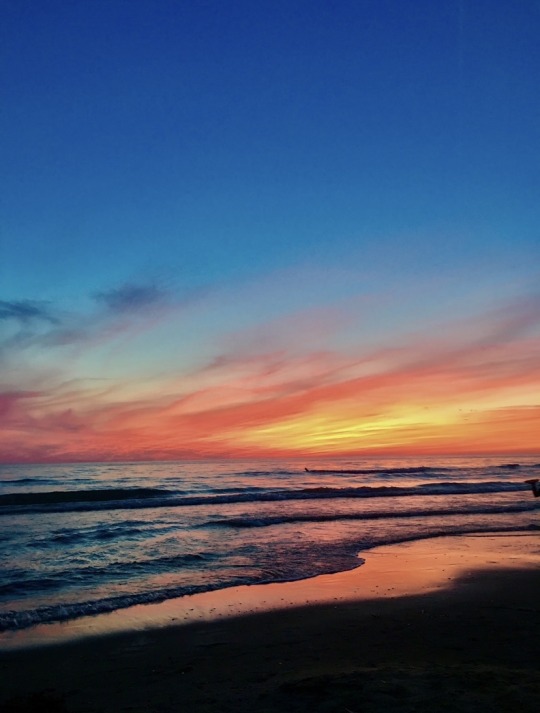
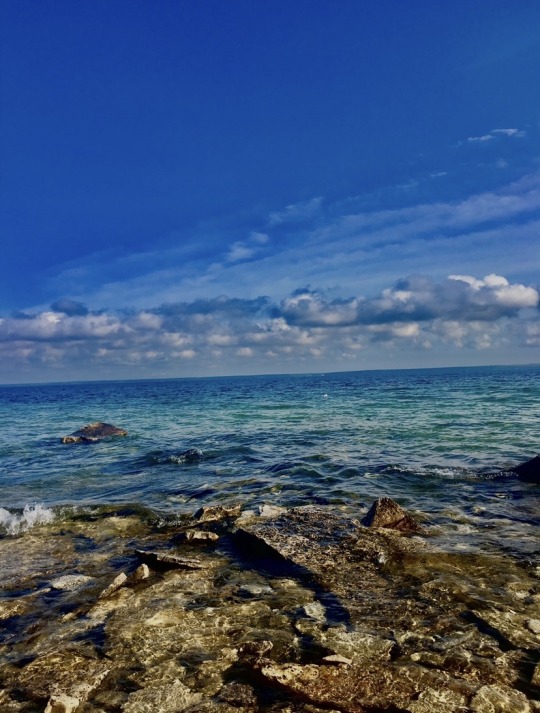
Here are a couple photos I took from my camping trips over the years :)
As I've mentioned previously I really enjoy being creative and expressing myself through art, so these camping trips are where some of my most creative ideas and visions have been created! Furthermore, they have some of the most beautiful trails throughout the forest and along the beach, some requiring hours to complete. This is one of my favorite things to do with my mom and we bond over it every year, which makes me even more appreciative of nature. My mom, my sister, and I have become quite interested in completing the end-to-end hike where you cover the entire 900 km Bruce Trail on foot over a couple of months. This would be such a cool experience to see the different landscapes all across the Bruce Peninsula and just an overall great accomplishment to have! If any of you have completed it or even did parts of the trail let me know as it would be really cool to discuss it!
I believe everyone should experience camping at least once in their life as it offers a whole new perspective on our relationship with nature. It helps you to not only discover new things about the world around you but also to discover new things within yourself. These trips played a big role in my interest in nature and pursuing environmental science courses at university!
1 note
·
View note
Text
Batfam meets dead boy detectives agency
Shenanigans of ghosts Dick, Jason, Tim and Damian set in an alternative universe where they never met as brothers, having died long before that, but become family all the same. While following around young, poor psychic Bruce Wayne and tormenting him into staying alive through finding purpose in solving cases and bringing justice.
Bruce Wayne nearly dies alongside his parents on that fateful day when they are shot when the Dead Boy Detectives were close by, solving the case of a victim from the Joker. Impulsively, because he saw himself in Bruce, Jason possessed the body of a young police detective by the name James Gordon and followed the instructions of Tim to save the boys life before the ambulance arrived. They were now at risk of being discovered for breaking a rule by the Lost & Found Departement, but none of the boys could find themselves to regret the decision to help Bruce.
Against their better judgement they stick around, using the excuse of solving cases to keep an eye on the boy. They see how he is consumed by grief and got into more and more reckless situations as if he was daring death to take him. Bruce was unable to live with the fact that he was spared and his parents weren't. Dick saved Bruce from falling to his death by appearing in front of the boy and screaming, neither prepared to the fact that Bruce can see ghosts. They think at first it has something to do with his near death experience, but Bruce then reveals that he is a psychic and because of that always seen as an outsider and bullied regardless of his wealthy status.
It was then decided by the Dead Boy Detectives that in order to remind Bruce that he still has purpose in living, they will show him how he can thrive through justice and that his gift isn't a curse. Some more reluctant than others bring him into the agency and together they go through many shenanigans and cases, all the while Bruce grows in age and talent alike under their tutelage. And before they know it they are a very unlikely and supernatural family.
And family always likes to help Bruce even when he becomes Batman and gets the title of greatest detective, takes in his own children and becomes a mentor. They love him forever, but that does not stop them from absolutely tormenting him as big brothers should.
In a bittersweet way it gets way less awkward to explain the strangeness of Bruce Wayne when his own wards go through near death experiences and finally meet their uncles.
~
~
What I think the boys would have died of and their circumstances as ghosts. While tempting to just give backstories from Edwin and Charles to two of them, I thought it would be more appropriate to give them their own version.
Dick was killed in 1936 at a concentration camp after having been separated from his family because of his Romani ancestry that made people (Nazis) believe him to be dirty. He died nameless, one of many, and with no grave for his body as he was left to carelessly rot away. His family lived, but they never knew what happened to him and were unable to follow through with their funeral rites to guide him to the afterlife. He found himself unable to move on however as he wished to bring justice to all those that were killed and merely labeled casualties in war like he had been.
It was Dick that started the Dead Boys Detectives Agency, hence the awful name as everyone proclaims with his terrible naming skills.
Damian was the youngest when killed and not too far back in time too, the 1970s. He had grown up under the restricting rules of his family back in Arabia Peninsula when he discovered plans of his grandfather that wanted to rip Damian of his own future plans. Still a young boy, he wanted none of that and after packing his things and stealing some money he ran away to the land of America where the TV always told him it was the land of the dreams. Anyone could become wealthy there. Damian wanted to show his grandfather that he knew better and would bring honour to their family, in his way. But Damian soon found himself without money, stranded and in a country where he barely understood the language. Then one day he was too desperate and despite his instincts telling him not to, he followed a man and trusted him. Later on he was killed by John Wayne Gacy. Damian only wished to stay around until the man was discovered and his family took his body back, but instead his family rejected him despite recognising the body.
Damian was a rage full and miserable ghost for a long time after his death and being discarded by his family as he couldn't understand why he was seen as dishonorable when he had been the victim, his family never once blaming the killer. As he wandered aimlessly and wished to bring misfortune on everyone, it was Jason that found him then when a witch wanted to use him for power and slowly got his trust after being rescued as the older boy taught him tricks to stay safe. Damian kind of just stuck around after that.
Tim despite not looking the part, is the oldest of the four, having been accused of witchcraft back in 1692 for simply wishing to heal people and yearning for more knowledge. His methods were unfit in their eyes and he was also seen as witch for looking too naturally feminine, blaming him to be putting up a false front and using bodyshifting to allure men. He was burned at the stake in Salem without ever having been listened to for once in his short life. This settled his resolve and he refused to move on, too stubborn to listen to death and instead find his own path.
In a strange way, Tim did not miss living as he soon realised. He had endless time now to learn whatever he desired. If it be science, languages, politics, autonomy or actually witchcraft now. Hah. He had so much to learn and he was delighted to just learn the laws and tricks in the world of the supernatural. This made him the expert in the Dead Boys Detectives Agency and he was called 'Old man' by the others for his behaviour and wisdom.
Jason just like all his brothers had been wronged. His death in 1950 was not out of the ordinary itself, a cop that shot him for the colour of his skin when he had done nothing wrong. It was an injustice and an action of racism, but in the grant scheme of things that just made him one of many and his family was able to mourn him for one thing. Unlike his brothers conflicted history. What truly wronged Jason however was when a careless necromancer came around and played with his body, just after he thought he was finally at peace and could move on. Instead he was yanked back into a body that was his but also not and he had no control over himself, left spiraling, as the body attacked others and gnawed at their skin. It sickened him and this time around he was glad when he was shot again. Murdered twice by the same man, one injustice one a saving grace. Jason from then on decided to never let others carelessly harm the innocent again.
Jason held some anger issues that he always attempted to hide away from others. Having grown up under heavy scrutiny of his father and the eyes of society that saw him as a dirty rat he had a lot of it bottled up inside. This makes him the most vicious ghost.
#batfamily#alternate universe#batfamily x dead boy detectives#dead boy detectives#bruce wayne is the little brother#he suffers the youngest syndrome#androgynous tim drake beloved#my man was too pretty and too smart so he died#hispanic jason todd#romani dick grayson#arab damian wayne#tim is just white rip#bruce wayne psychic#he is creepy but now it makes sense why#bruce wayne sees ghosts#alfred is just tired#Steph Duke and Cass would be the doomed Robin legacy now#but they get cool and dead uncles
11 notes
·
View notes
Text
Blog 1: Current Relationship with Nature
Hey everyone! I'm currently attending my fourth year at the University of Guelph. I am majoring in Environmental Sciences and minoring in Ecology, and I've loved every minute of it. I am also a co-op student which has allowed me to work in multiple different environments and positions, majority of which have involved a large amount of field work.
In regards to the prompt for this week's post, I've always greatly enjoyed being outdoors and immersed in nature. From camping and hiking in the summer months to skiing and snowshoeing in the winter alongside my family, nature has always been a major part of my life. I've always had a strong passion for the environmental sciences, which is why I decided to pursue it in my post-secondary education. I think a lot of this passion was strongly tied to how often my family involved me in the outdoor activities I mentioned above, and I think it helped to gain an appreciation for nature that I feel many people nowadays do not have.
My first big camping trip was when I was 10 months old where my parents and I visited 4 Ontario provincial parks along our long road trip to Thunder Bay. These included Craigleigh, Windy Lake, Agawa Bay (aka. Lake Superior Provincial Park), and Kakabecka falls. Since then, I have visited and camped at 28 Ontario provincial parks, and 4 national parks in Canada. Of these, my favourites have been Algonquin Park, Bruce Peninsula National Park, Grundy Lake, and Grasslands National Park (SK). It's safe to say that camping is a big part of my life and it has also had a major role in shaping my current relationship with nature. I have greatly enjoyed partaking in hikes and kayaking trips across the lakes during these, and it's always such a breathtaking experience (literally and figuratively). I love the views that the hikes provide, and I always spend a long amount of time taking everything in, and how beautiful nature can be. Often, the views can make you feel small, which is very humbling experience that makes you appreciate nature and, in my experience, creates a sense of responsibility to protect it. My many kayaking trips have provided similar experiences, and I love the many different plants and animals I encounter on these journeys.
Throughout my co-op experiences, I have been able to pursue a position that with a large focus on field work. My favourite has been this past summer which I spent in Indian Head, Saskatchewan working with Agriculture and Agri-Food Canada in their Agroecosystems section. Saskatchewan was one of the best experiences of my entire life, and I am so grateful to the people who made the trip, and the job, possible. While I was out there, I got to know the 6 other students I was working with and formed strong bonds with them which I will always cherish. I also had the opportunity to explore this province through my field work as well as outside this work and was able to appreciate the different geography and flaura and fauna of the area. It was during the trip out to my placement that allowed me to finally achieve my goal of visiting all 10 provinces of Canada as my last three I needed to visit were Manitoba, Saskatchewan, and Alberta. I was able to take some time off during my work term to visit Jasper, Alberta, and it was such a beautiful and almost otherworldly experience seeing and experiencing the quiet of the mountains. On my journey back to Ontario, I was also able to stop by Lake Michigan to complete my other goal of visiting all 5 Great Lakes. My next goal is to visit all 3 Territories. Overall, this past summer was one of my favourites, and it deepened my already strong relationship to/appreciation for nature, and I would highly recommend and encourage similar experiences of other people, especially co-op students.
I could likely fill a whole book an my relationship with nature, most of which would consist of my favourite stories and memories of my "adventures", but this post is getting a little long (lol). To answer the question "who offered me 'a sense of place'," I would say my parents who allowed me to visit the many places I have been to. I have so much love and appreciation for both my parents and the experiences they provided for me, and I hope that one day I can do the same for my children. Without them and their passion for camping and exploring what all of Canada has to offer, I would likely not have developed the appreciation for nature that I currently have. Overall, my main takeaway message from this would be that being out and present with nature is an important part of a persons' life, and I strongly advocate for more people to allow themselves time to take a walk in the woods, or even just a regular hiking/walking trail in their city to be able to be present and appreciate nature.
Enjoy some photos I've taken of my travels this summer below :)


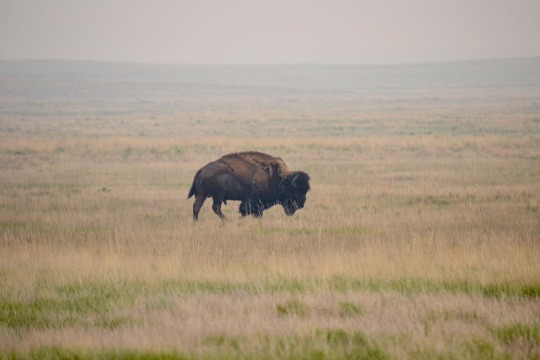
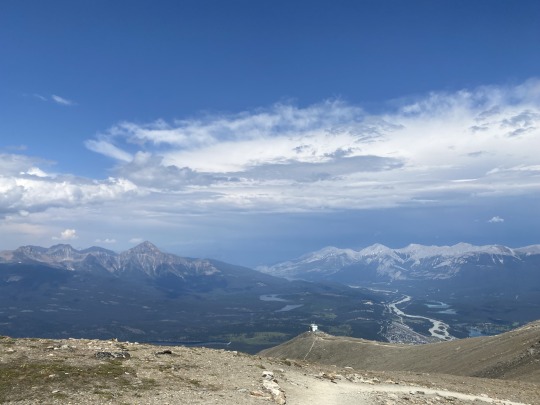

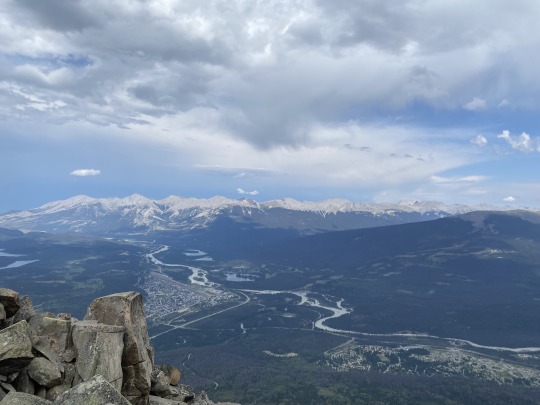
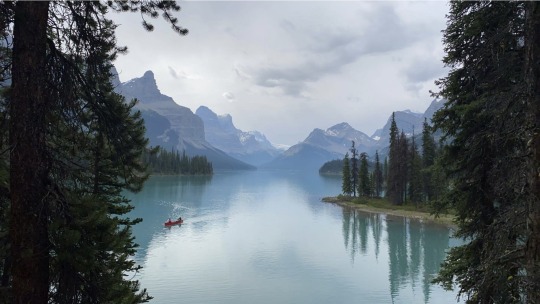
15 notes
·
View notes
Text
I just made myself sad cause I ended up looking up on the Eastern Massasauga Rattlesnake (native to Ontario, I've mostly only have heard of it being in the wild while camping up in the Bruce Peninsula in the past) and ended up seeing a before/after of their natural range from the google results.
It's sad cause as far as venomous snakes go they are known to be pretty shy. I've heard of some peeps saying they've almost stepped on them and not get bitten cause how much they don't wanna waste their venomous bite on a bumbling giant (not that it'd be wise to be testing that though).
I also didn't know they were associated with the range of the tallgrass prairie since the ones I had heard about- being in the Bruce- are in the open rocky places of the cliffs out from the forest. 🥺
#I'm actually skittish with wild snakes myself but I still love them- I've kept myself calm while watching a small Garter Snake in the grass#Eastern Garter Snakes are the more likely albeit rare sighting in my neck of Ontario#but I've learned from the Ontario Herp group I follow on FB that there are actually quite a diversity of snakes in Ontario???#water snakes I knew of being in some places but not Hognose snakes or Fox snakes to name a few surprises for me#ramblings
4 notes
·
View notes
Text
TWENTY-FIVE
The sea was good night and morning,
the winds were friends, the calm was kindly –
the snow seeks the burn, the brown fronds scatter;
my dancing days for fishing are over.
GEORGE CAMPBELL HAY, Wind on Loch Fyne (1948)
THERE IS A weird phenomenon not unknown to me that scientists call hypnopompia. It’s that occasionally unpleasant period between sleep and wakefulness. I experience it this morning in Tarbert after a night spent crashing like a hobbit on a wafer-thin layer of polyester. I get it when, after an uncomfortable, spasmodic, arthritis-inducing snorefest, I crouch in the tent to don my boots and hurtle forward into a clump of bracken.
I stretch my muscles and rub the tick bite on my backside this morning. I feel like a small furry animal emerging from hibernation. I realise that the zip of the sleeping back has left its indentation on my face. Camping isn’t for me, I conclude but, after walking for a few yards, I demur. I gaze from on high upon the perfectly situated harbour town of Tarbert, and the dazzling East Loch Tarbert that beautifies it.
In 1843 Cockburn asked: 'How it is that I have never heard of that curious little bay? – there it lay, calm and silvery – a curve of about twenty or thirty small houses drawn round the upper end, all comfortable- looking – the ruins of an old castle standing on a rocky knoll at the left side of the entrance – a striking and beautiful spot like a scene from a theatre.'
And Guernsey-born geologist John Macculloch wrote of Loch Tarbert: 'The water was like a mirror, and as the sun reached the dewy birch woods, the air was perfumed by their fragrance, while the warbling of ten thousand thrushes on all sides, with the tinkling sound of the little waves that curled on the shore, and the gentle whispering of the morning air among the trees, rendered it a perfect scene of enchantment.'
I am enchanted too. I stand on the rocky knoll which Cockburn noted. There are none of Macculloch’s thrushes, but a cuckoo and meadow pipits vie for musical attention. A shag poses on a rock out on the fringes of this inlet of Loch Fyne, unperturbed by anchored yachts. A female sparrowhawk glides overhead. The lochside remains wonderfully wooded. The vista has an antihistamine effect; to blazes with my bites. Loch Fyne glitters over there and we can see the distant outline of lofty Beinn Mhor on the Cowal peninsula. The coffee is potable. All is right again in the world.

West Loch Tarbert is less than a mile away from its eastern brother. It is the land in between that prevents Kintyre from being an island. There is an oft-repeated story that King Magnus of Norway had his longboat dragged across this isthmus to bag the peninsula. According to the Icelandic historian Snorri Sturluson the king made an arrangement with Malcolm III of Scotland that he could take possession of land on the west coast around which a ship could sail. By taking command of his ship’s tiller and ‘sailing’ across the isthmus, he was able to claim the entire peninsula. Norway nobbled Kintyre for 12 years. That dragging of boats would be similar to the portages of Canada and the ‘diolkoi’ of Greece. There was a paved trackway on the Isthmus of Corinth, across which vessels were lugged. The shortcut allowed the Corinthians to avoid the long and dangerous circumnavigation of the Peloponnese peninsula. To avoid the perilous Mull of Kintyre, sailors likewise used the isthmus of Tarbert (Gaelic tairbeart means ‘carrying across’).

We had camped last night on the edge of a community woodland next to Tarbert Castle, on one wall of which conservationists have had to use modern brickwork and concrete to stop it falling down. The Annals of Ulster place a fortification on Tarbert hill in the eighth century. The first stone castle went up in the 13th century, Edward 1 seized it, and Robert the Bruce took it back. Bruce’s Exchequer Rolls dealing with the work at the castle is one of the oldest historical documents in Scotland. James IV built a tower house at the castle, which has been painstakingly restored by volunteers, and the castle is now owned and operated by the Tarbert and Skipness Community Trust.
Tarbert grew up as a fishing village, and Harbour Street used to be lined with ‘farlans’, long wooden troughs in which peripatetic women gutted, cleaned and cured the catches as they landed. They would travel around the ports for work, and there was the inevitable revelling. The local sheriff had told Cockburn it was ‘a profligate place’ . As forthright as he always was, Cockburn declared: 'Nonsense! I don’t believe it. The brawls, which are his only facts, must proceed from the stranger fishers who nestle in it. I won’t believe anything bad of the natives of that little Virgilian port.
“This Sheriff a worthy, ugly, sensible, cart-horse of a man, hideously ugly, and with a coarse, high-keyed, idiotical voice, at which the very stots stare. Sir Walter Scott once amazed us all by taking this strange, good, and most illiterate creature to Paris with him, the most incomprehensible fact in the history of either man.'

Tarbert is associated with father and son Hay, both of whom left their literary mark. John MacDougall Hay was born in Tarbert in 1881, the son of a steamship agent, and he became a minister. His dark, tragic, pessimistic powerful novel, Gillespie, was set in Tarbert and was praised by Thomas Hardy and likened to the classic House with the Green Shutters. Hay died, a mere 38. His son, George Campbell Hay, became one of Scotland’s most talented, but unsung, poets. His playground was the shore of Loch Fyne, where he hung around fishermen, and he wandered the idyllic woods and hills around Tarbert. He wrote knowledgeably about the natural world, and understood the world of nets and spindrift. He wrote in English, Gaelic and Scots, and translated from Welsh, Irish, French, Greek, Italian, Norwegian and Arabic.
In October 1940 Hay hid in the hills to avoid conscription. He was arrested in Arrochar the following May and jailed until he reported for duty in the Royal Army Ordnance Corps at Catterick, where he met the poet Sorley MacLean, who later recalled that they ‘had two splendid afternoons and evenings when we talked Gaelic poetry the whole time’. Sadly, Hay Junior was a complex man dogged by mental illness and alcoholism. He died in squalor in Edinburgh in 1984.
From Tarbert we took the bus down the western flank of Kintyre. The ferry to Islay ran from Kennacraig, five miles away, but we decided to proceed to the village of Tayinloan, whose boat connects with the island of Gigha. We waited in Big Jessie’s cafe, next to the terminal where we were entertained by the waitress, who makes a mean meringue and keeps axalotls as pets. Seemingly, they’re like salamanders.

0 notes
Text
Events 10.14 (after 1950)
1066 – The Norman conquest of England begins with the Battle of Hastings. 1322 – Robert the Bruce of Scotland defeats King Edward II of England at the Battle of Old Byland, forcing Edward to accept Scotland's independence. 1586 – Mary, Queen of Scots, goes on trial for conspiracy against Queen Elizabeth I of England. 1656 – The General Court of the Massachusetts Bay Colony enacts the first punitive legislation against the Religious Society of Friends. 1758 – Seven Years' War: Frederick the Great suffers a rare defeat at the Battle of Hochkirch. 1773 – The first recorded ministry of education, the Commission of National Education, is formed in the Polish–Lithuanian Commonwealth. 1774 – American Revolution: The First Continental Congress denounces the British Parliament's Intolerable Acts and demands British concessions. 1791 – The revolutionary group the United Irishmen is formed in Belfast, Ireland leading to the Irish Rebellion of 1798. 1805 – War of the Third Coalition: A French corps defeats an Austrian attempt to escape encirclement at Ulm. 1806 – War of the Fourth Coalition: Napoleon decisively defeats Prussia at the Battle of Jena–Auerstedt. 1808 – The Republic of Ragusa is annexed by France. 1843 – Irish nationalist Daniel O'Connell is arrested by the British on charges of criminal conspiracy. 1863 – American Civil War: Confederate troops under the command of A. P. Hill fail to drive the Union Army completely out of Virginia. 1884 – George Eastman receives a U.S. Government patent on his new paper-strip photographic film. 1888 – Louis Le Prince films the first motion picture, Roundhay Garden Scene. 1898 – The steam ship SS Mohegan sinks near the Lizard peninsula, Cornwall, killing 106. 1908 – The Chicago Cubs defeat the Detroit Tigers, 2–0, clinching the 1908 World Series; this would be their last until winning the 2016 World Series. 1910 – English aviator Claude Grahame-White lands his aircraft on Executive Avenue near the White House in Washington, D.C. 1912 – Former president Theodore Roosevelt is shot and mildly wounded by John Flammang Schrank. With the fresh wound in his chest, and the bullet still within it, Roosevelt delivers his scheduled speech. 1913 – Senghenydd colliery disaster, the United Kingdom's worst coal mining accident, claims the lives of 439 miners. 1915 – World War I: Bulgaria joins the Central Powers. 1920 – Finland and Soviet Russia sign the Treaty of Tartu, exchanging some territories. 1923 – After the Irish Civil War the 1923 Irish hunger strikes were undertaken by thousands of Irish republican prisoners protesting the continuation of their internment without trial. 1930 – The former and first President of Finland, K. J. Ståhlberg, and his wife, Ester Ståhlberg, are kidnapped from their home by members of the far-right Lapua Movement. 1933 – Germany withdraws from the League of Nations and World Disarmament Conference. 1939 – World War II: The German submarine U-47 sinks the British battleship HMS Royal Oak within her harbour at Scapa Flow, Scotland. 1940 – World War II: The Balham underground station disaster kills sixty-six people during the London Blitz. 1943 – World War II: Prisoners at Sobibor extermination camp covertly assassinate most of the on-duty SS officers and then stage a mass breakout. 1943 – World War II: The United States Eighth Air Force loses 60 of 291 B-17 Flying Fortresses during the Second Raid on Schweinfurt. 1943 – World War II: The Second Philippine Republic, a puppet state of Japan, is inaugurated with José P. Laurel as its president. 1947 – Chuck Yeager becomes the first person to exceed the speed of sound. 1949 – The Smith Act trials of Communist Party leaders in the United States convicts eleven defendants of conspiring to advocate the violent overthrow of the federal government.
0 notes
Text
Week 2: My Ideal Role as an Interpreter
I had the opportunity recently to read Edward Abbey’s Desert Solitaire. It’s rough around the edges, out-of-touch, and more than a little anarchist, but Edward Abbey also has an incredible prose when discussing nature. The book describes his time as the lone park ranger at Arches National Monument in Southern Utah. His passion and reverence for the park is undeniable, and his love of wilderness in general shines through. This quote I thought was particularly poetic:
“A weird, lovely, fantastic object out of nature like Delicate Arch has the curious ability to remind us - like rock and sunlight and wind and wildflowers - that out there is a different world, older and greater and deeper by far than ours, a world which sustains the little world of man as sea and sky surround and sustain a ship.” (Edward Abbey, Desert Solitaire).
I read Desert Solitaire while traveling through Utah and Arizona this spring, and Abbey’s descriptions of the desert are the closest thing I’ve seen to capturing how beautiful the landscape is. This quote to me is an inspiring piece of nature interpretation. It made me think of my favourite teachers in school: they weren’t incredible teachers simply because they helped me understand the material. They were passionate about it, they made me care about the material.

Watchman Trail, Zion National Park, Utah (April 2024).
Recently, I’ve been considering a career change into the field of environmental conservation. I’ve been driven by my love of the outdoors, and the desire to see nature conserved for future generations. I’m never more at ease than I am in the backcountry, staring into a fire. My ideal interpretive role would allow me to spend more time outdoors, getting my hands dirty with the hard work of conservation, while allowing me to help people care about what they see.
Over the past few years, driven in large part by the isolation experienced during covid lockdowns, the number of people camping has skyrocketed. Trailer and RV sales are up, and for anybody who's been a longtime camper, the effect is obvious when trying to book a site, both in surging prices and seasonal availability. It would be easy to see this, as Abbey likely would have, as a net negative. Crowded parks, inexperienced campers trudging on sensitive flora, or leaving garbage where they shouldn’t. The examples on social media of misguided and downright moronic interactions with wildlife are plentiful. But what we want is for a greater portion of the population to connect with nature, to see why we love it so much, see what makes it special. In that light, the surge of people getting outside to experience our parks can only be positive.

Fire through the Parks Canada Logo, Bruce Peninsula National Park (October 2023).
Which is why nature interpretation is becoming increasingly important. Like our best teachers, good interpreters need to help people care about what’s around them. As an interpreter, my ideal role would be grounded in this. A role in parks, specifically as a ranger/park warden has always appealed to me greatly for these reasons. We are lucky enough to live in Canada, a country with some of the most beautiful natural wilderness anywhere in the world. Protecting and conserving it, while making sure everyone has the opportunity to enjoy it would be my ideal interpretation role. Specifically which park is less important to me, as Canada has so many fantastic ones, though my favourite parks I've been to are Gros Morne and Kluane.
0 notes
Text
Memorable Ontario Holiday: Top Experiences and 6 Best Hotel Deals Near Niagara Falls
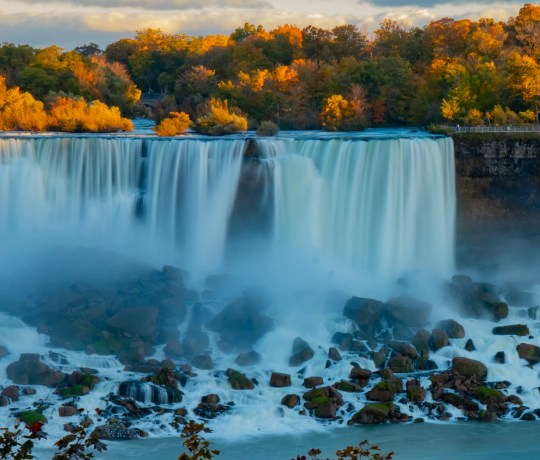
Ontario, the eastern province of Canada, is an ideal holiday destination, offering a diverse range of attractions and experiences. One of the most renowned highlights is Niagara Falls, a natural wonder that captivates millions of visitors each year. Ontario's appeal lies not only in its natural beauty but also in its vibrant cities, rich cultural heritage, and outdoor adventures. #ExploreOntario #OntarioAdventures #DiscoverOntario #OntarioNature #VisitOntario Niagara Falls, located on the border between Ontario, Canada, and New York, USA, is one of the most famous waterfalls in the world. Comprised of three waterfalls – Horseshoe Falls, American Falls, and Bridal Veil Falls – Niagara Falls offers breathtaking views and thrilling experiences. The Horseshoe Falls, the largest of the three, is entirely within Canada and provides a stunning backdrop for a variety of activities.

Visitors can get up close to the falls on the iconic Maid of the Mist boat tour, which takes you right to the base of the thundering waters. For a different perspective, the Journey Behind the Falls tour allows you to walk through tunnels and stand in observation decks directly behind the cascading water. The nightly illumination of the falls and the seasonal fireworks add a magical touch to the experience.

Beyond Niagara Falls, Ontario boasts a wealth of attractions. Toronto, the capital city, is a bustling metropolis known for its iconic CN Tower, diverse culinary scene, and vibrant arts and culture. Visitors can explore world-class museums such as the Royal Ontario Museum and the Art Gallery of Ontario, or enjoy shopping and entertainment in the Distillery District and Kensington Market.

Ottawa, the capital of Canada, is another highlight, offering historic landmarks like Parliament Hill, the Rideau Canal, and the National Gallery of Canada. The city is particularly beautiful in winter when the Rideau Canal transforms into the world's largest skating rink. For nature enthusiasts, Ontario's national and provincial parks provide ample opportunities for outdoor activities. Algonquin Provincial Park is perfect for camping, hiking, and canoeing, while Bruce Peninsula National Park offers stunning views of Georgian Bay and the famous Grotto.

Ontario hosts numerous festivals and events throughout the year, reflecting its rich cultural diversity. The Toronto International Film Festival (TIFF) attracts celebrities and film enthusiasts from around the globe. In Ottawa, Winterlude celebrates the season with ice sculptures, snow slides, and winter sports.

The Niagara region is also famous for its wine country. The Niagara Wine Route features over 100 wineries, where visitors can enjoy wine tastings and vineyard tours. The annual Niagara Icewine Festival celebrates this unique Canadian delicacy with events and tastings.

A holiday in Ontario offers an unforgettable blend of natural beauty, urban excitement, and cultural richness. From the awe-inspiring Niagara Falls to the bustling streets of Toronto and the historic charm of Ottawa, Ontario provides a diverse array of experiences that cater to all types of travelers. Whether you're seeking adventure, relaxation, or cultural enrichment, Ontario promises a memorable and enriching holiday.
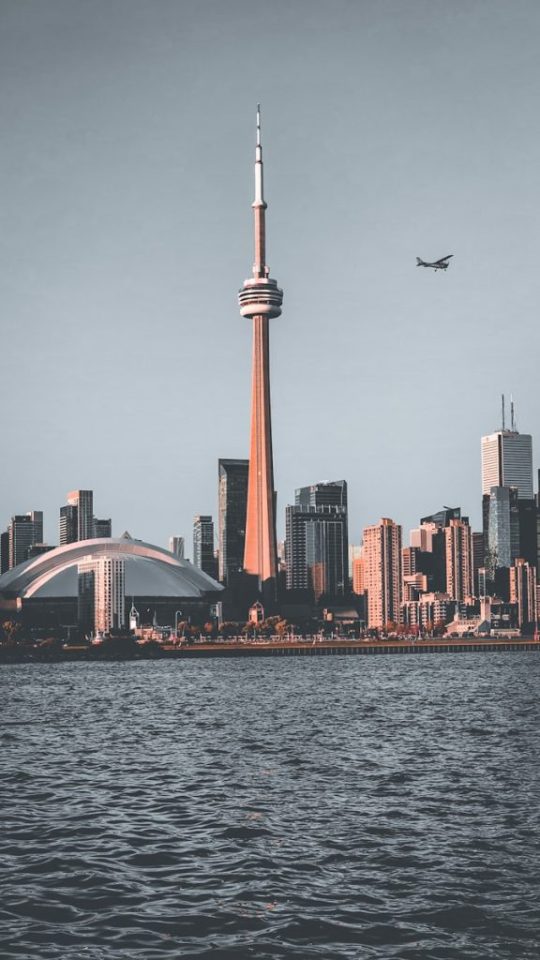
Travel Resources Booking.com is available in 43 languages and offers more than 28 million reported accommodation listings, including over 6.6 million homes, apartments, and other unique places to stay. TripAdvisor is the world’s largest travel guidance platform. With more than 1 billion reviews and opinions of nearly 8 million businesses, travelers turn to Tripadvisor to find deals on accommodations, and book experiences. Klook is a booking platform on which travelers can book hotels, cars, tours and activities, tickets to attractions, and shows at great prices. Hotellook is a service that helps you find and compare prices on hotels around the world, provided by a leading reservation system. Today, Hotellook.com offered to put together information on more than 250,000 hotels in 205 countries. Hostelworld the global hostel-focused online booking platform, inspires passionate travelers to see the world, meet new people, and come back with extraordinary stories to tell. Hostelworld has more than 13 million reviews across over 17,000 hostels in more than 179 countries, making the brand the leading online hub for social travel. WeGoTrip is an online service for booking audio excursions and tours on 35+ countries on different languages (mostly english). Travelers can take audio excursions created by professional tour guides and local experts. Go City Multi-attraction passes for the top tourist destinations worldwide for up to 65% off the initial cost. Tiqets’ innovative technology ensures that travelers can book tickets on their phone at the last minute, receive their tickets directly in a digital form, and show their mobile phones in place of physical tickets to museums, places of interest, and attractions. Offers available passes in Europe and the US.

You can find the best car rental prices at QEEQ.COM. QEEQ.COM serves road trip travellers from different countries by working with car rental companies all over the world. Rail Europe is the leading distributor of European rail products. The company provides access to an extensive array of rail products from over 50 European train companies. Intui.Travel is a platform for booking transfers in 175 countries from the best local transport companies. Read the full article
0 notes
Text

Owen Sound Beach
Which is the best thing to do in canada ? Is it Sauble beach camping or rent a cottage in Bruce Peninsula or Bruce Peninsula camping or a memorable visit to Owen Sound Falls or camping at Owen Sound Beach or step out for Owen Sound hiking trails or end up at kilsyth country camping (KCC) Owen Sound to make it the most lovely and memorable day of your life . You will get here everything you have imagined, be it camping or fishing or biking or any other exiting to do activities.
0 notes
Text

"Evacuated Farmers Allowed To Return To Pick Apple Crop," Owen Sound Sun-Times. October 2, 1942. Page 2. ---- May Enter Military Area at Certain Specified Dates ---- GO BY 9TH LINE ---- Former residents of the St. Vincent and Sydenham tank range have been given permission to remove the fruit from the farms formerly owned by them. Announcement to that effect was made on Thursday night by Brigadier E. C. Spencer, Camp Commandant at Camp Borden. Special permission has been received from the Department of National Defence in order that the former owners will not lose weir fruit. Brigadier Spencer pointed out that when the Department purchased these properties it included all the fruit in the area, and it is only because of a concession on their part that they are now being permitted to go into the area and take it out. It was officially announced that firing would cease on the range at midnight on Thursday nights for a three week period, and will not be resumed until midnight on Sunday night. The open dates on which the farmers will be allowed to get their fruit are Friday, Saturday and Sunday, October 2, 3 and 4: Friday, Saturday and Sunday, October 9. 10 and 11, and Friday, Saturday and Sunday, October 16, 17 and 18 It is to be clearly understood that only fruit will be permitted to be removed from the premises. All entry to the area will be made on the 9th line of St. Vincent, where there will be a military guard, and those gathering the fruit will sign in and out at the south boundary of the 9th line. On no condition should any former resident endeaver to enter the area at any other point than the 9th line gate.
The military authorities feel that this should be a sufficient length of time to permit of the gathering of all the fruit in the area. Brigadier Spencer also pointed out that it was never intended that there should be any waste of the fruit in the area, as had not this permission been granted soldiers under the order of the Transport and Supply Department would have been sent in to pick the fruit. which would have been taken to Camp Borden and used by the soldiers.
#meaford#meaford military camp#camp meaford#tank range#canadian army#canadian military#armored warfare#tank regiment#military training#moved by the state#forced migration#farming in canada#rural canada#harvest time#bruce peninsula#canada during world war 2#land expropriation#world war ii#camp borden
1 note
·
View note
Text
Camping in canada ontario: Exploring the Natural Beauty of Ontario
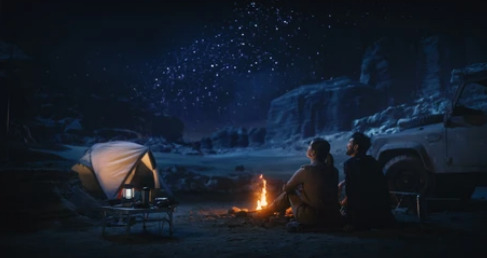
If you're a camping in canada ontario enthusiast looking to explore the natural beauty of Canada, Ontario is a great place to start. Ontario is a camper's paradise with its stunning landscapes, diverse wildlife, and abundant outdoor recreational opportunities.
Choosing the Right Campsite in Ontario
Ontario offers many camping options, from backcountry camping to family-friendly campgrounds. For backcountry camping, explore the beautiful parks in Ontario's northern region. Killarney Provincial Park offers stunning vistas and many trails for hiking, trekking and photographing. Bruce Peninsula National Park is great for wildlife watching and provides breathtaking views of Georgian Bay.
Ontario has many provincial and national park options, such as Algonquin, Arrowhead, and Bon Echo Provincial Parks, for those who prefer more developed campgrounds. These parks offer car camping, RV sites, cabins, and yurts to accommodate various camping needs and preferences.
Activities and Attractions in Ontario's Campgrounds
Ontario's campgrounds offer plenty of outdoor recreational opportunities. Take advantage of the numerous hiking trails available, canoe or kayak on one of the many lakes or rivers, or experience the thrill of fishing. In Algonquin Provincial Park, visitors can paddle the historic canoe routes and scenic lakes where wildlife sightings are common. In Bon Echo Provincial Park, hikers can follow the challenging Mazinaw Rock Trail, which features a view of the Mazinaw Lake and the Mazinaw Rock Cliff. Bruce Peninsula National Park features hiking trails with unparalleled views of Georgian Bay and the surrounding region.
Tips for camping in canada ontario Ontario
When planning a camping trip in Ontario, Canada Ontario, checking for local regulations, obtaining necessary permits, and following leave-no-trace principles are essential. Ontario's wildlife, like bears, can be seen all across the province, and precautions should be taken. Be prepared for changing weather conditions, pack accordingly, and bring a map and a compass if you plan to camp in the backcountry.
Conclusion
Whether you're seeking serene seclusion and the natural beauty of the backcountry or the comfort and amenities of a convenient campground, Ontario offers an incredible range of camping experiences. Pack your bags and discover the natural wonderland that Ontario has to offer. Whether you're a seasoned camper or just starting out, the beauty and adventure of camping in canada ontario is something you won't want to miss.
0 notes
Text
My Relationship with Nature – Blog 1
Nature (according to me): a safe haven, a connected community, a place of exploration, a beautiful sight, a provider, a piece of art… I could go on for ages.
Nature has given me so much joy from an early age. I constantly seek to improve my relationship with nature and enjoy all of the benefits it provides us with, including purified air, a sense of relaxation, an environment to ground and escape our busy lives, stunning views, and a sense of home. Hiking, swimming, and nature photography are just a few ways that I like to connect with nature. Due to my interest in nature, I knew that environmental science was the perfect program. I feel blessed to have benefitted from the environmental science co-op program at the University of Guelph. In this program, I’ve been given the opportunity to work in various environmental fields and conduct environmental monitoring through gas and water sampling. This past summer was spent working with a conservation authority during my co-op placement, where I conducted routine water sampling in the Grand River watershed to record water quality parameters such as pH, turbidity, dissolved oxygen, conductivity, and temperature. Water quality monitoring is crucial to ensure that the water quality remains acceptable to support the numerous types of organisms that rely on it, ranging from aquatic plants to fish and benthic invertebrates! However, working in an environmental career can weigh heavy on the heart when realizing that humans have caused so much pain to the one earth we have. I often wince when hearing about oil spills in oceans, uncontrollable wildfires that consume vast areas of trees and destroy wildlife, and tsunamis that wash away entire communities, to name a few environmental catastrophes. Due to my empathy for the environment, I believe I am deeply intertwined with nature, which has shaped my life.
At age 4, I was first introduced to the benefits of nature from cottage visits, where I participated in various recreational activities that nature provides, including swimming, fishing, boating, and hiking. My interest grew after many summers at my cottage and extended into my high school studies. At 14, I took a particular interest in the environmental lessons in science class and began to get a feel for my future career. At age 16, I travelled to summer camp near North Beach Provincial Park in Consecon, Ontario, where I spent whole days with campers and helped many campers gain comfort outdoors. At age 18, I decided to sign up for my first ecotourism trip with Operation Groundswell. Here, I travelled to Cusco, Peru, and learned about the environmental injustices that the Indigenous community faces regarding mining. I became interested in environmental justice, and I was able to spend three days hiking in the Sacred Valley, where I could experience mountains for the first time (which can be viewed in my Tumblr header). This trip was a great form of nature interpretation and allowed me to immerse myself in nature and Peruvian culture while learning about global environmental issues. When it came time to enroll in university, I decided that the University of Guelph would be the perfect atmosphere to further my studies regarding the environment. After four years, three co-op placements, a stunning trip to Bruce Peninsula Provincial Park with the UofG Outdoors club, and lots of learning, I am now one semester away from completing my degree in environmental science. In the future, I plan to further my relationship with nature and obtain a career focused on environmental monitoring and stewardship.
It truly is an understatement to share that nature has shaped my life and continues to do so. I look forward to furthering my knowledge and experiences in nature, and I hope everyone can feel a deep connection with nature sometime in this lifetime.

1 note
·
View note
Text
Unit 6: The Passing Train Of Life
A community that ignores its origins is no better than a person who lost their memory. Its important to remember the past because its significant for what we do now.
This quote is saying that you should not ignore the past because it’s significant for the present. Although the train is no longer at the railway station, the station still exists. You must look at situations holistically because although life’s moments are scattered, they all interrelate and play a part with each other. Just because something is a memory doesn’t mean we should act like it’s done with.
I think this is a good quote to remember in moments we need to stay grounded. For example, if an individual applies for a prestigious grant every year for a decade and receives it every time, by the end of the decade it may not be a big deal. This person can go on to gloat, stop being humble, and stop working as hard because they are already exceeding beyond others who are in a similar academic/professional position. The quote, to me, is saying that we need to remember how we got to where we are now. There were likely hundreds of moments where the scholar had to pull all-nighters studying, nearly failed a test, and felt upset because they weren’t confident in their journey. Just because those moments are in the past doesn’t mean we should forget about them. We must, as the quote says, keep together the parts of any whole (in this case, being life!) so we can remain true to ourselves and learn from our mistakes (Beck et al. 2018). Our past is what makes who we are in the present, and if we maintain integrity then our future will be positive.
This relates to nature interpretation because it shows that history relates to our current lives, which can be applied to the environment and beyond (Beck et al. 2018). The lessons learned in our past help us navigate new obstacles and challenges (Beck et al. 2018). An example from my own life is when I went camping. The first time I went camping, we went backcountry and hiked three hours out in the bruce peninsula.

Unfortunately, we forgot dinner for one of the nights and were stuck eating disgusting chia seeds. But the texture weirded us out too much so we ended up just playing around with it lol.

The next time I went camping, I didn't “forget the railway station” just because “the train has passed”, I made sure to learn from my past mistakes and packed all the meals and some extra snacks-- just in case. I acknowledged my past humbly and packed the food with integrity. Our interactions with and within nature are deeply rooted in the choices we actively make to be better equipped to handle all that nature has to offer. To best interpret the world around us, we need to make sure we are constantly evolving and learning so we can be best prepared to take it head-on. That means making sure we set our minds and bodies up for success by preparing properly and nourishing ourselves.
I’d be interested in knowing your personal stories of times when you had to remember your past and your roots so you can achieve higher states of consciousness/awareness when involved with nature! Looking forward to reading more. :^)
Mishell
Beck, L., Cable, T.T., & Knudson, D.M (2018). Interpreting Cultural and Natural Heritage for a Better World (1st ed). Sagamore Venture
1 note
·
View note